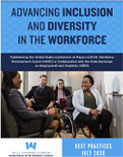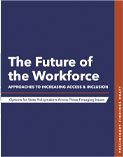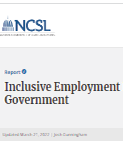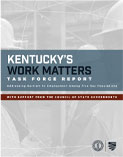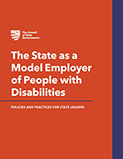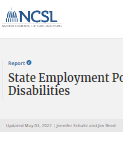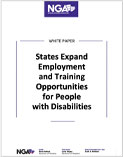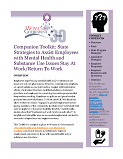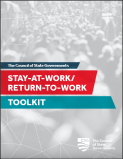Highlighting Effective Policies & Practices
SEED and its partners have developed a suite of resources to assist state and local policymakers in their efforts to advance disability-inclusive policy based on the following topic areas:


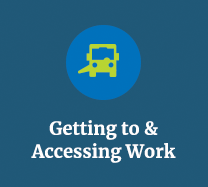

For COVID-19 specific resources, please visit our dedicated COVID-19 Resources for Policymakers page.
Advancing Inclusion and Diversity in the Workforce
This report from USCM’s Workforce Development Council features best practices and programs from cities across the country that have proven successful in increasing employment outcomes of people with disabilities.
Disability-Inclusive Telework for States: State Approaches to Increasing Access & Inclusion
This issue brief offers guidance to state policymakers on developing and implementing more inclusive telework policies and programs for state agencies. The brief also includes an overview of workplace protections under the Americans with Disabilities Act and summarizes the fiscal impacts of inclusive telework.
The Future of the Workforce: Approaches to Increasing Access & Inclusion
CSG’s report highlights preliminary findings of state strategies and policy options to increase access and inclusion for people with disabilities among three emerging topic areas: advances in automation and technology; the rise of the gig economy; and the changing nature of apprenticeship.
Inclusive Employment Practices in State Government
NCSL’s resource webpage highlights various policy options designed to strengthen employment opportunities for people with disabilities within state government. The policy topics featured include creating a policy development infrastructure, inclusive state hiring practices and inclusive state retention practices.
Kentucky Work Matters Task Force Recommendations
This report looks at issues and options specific to the state of Kentucky, but with potential for replication or adaptation by other states. CSG's Kentucky Work Matters Task Force Lessons Learned highlights best practices gleaned from the Task Force's process and results.
The State as a Model Employer of People with Disabilities: Policies and Practices for State Leaders
This CSG report explores strategies states can use to promote diversity, equity, inclusion and accessibility principles within the public-sector workforce and highlights policies and practices to recruit, hire and retain workers with disabilities.
State Employment Policies for Veterans with Disabilities
This NCSL report features background on demographics and employment for veterans with disabilities, as well as several state policy options to support those entering or remaining part of the civilian workforce.
States Expand Employment and Training Opportunities for People with Disabilities
NGA's issue brief outlines opportunities for governors to help people with disabilities overcome barriers to employment and successfully enter and remain in the workforce.
Inclusive Apprenticeships
CSG's policy curriculum outlines strategies states can take to facilitate skill development and job exploration opportunities for individuals with disabilities through work-based learning programs such as apprenticeships. The curriculum also features a variety of state policy examples and resources to help make apprenticeship programs more inclusive of people with disabilities.
The Future of Apprenticeship: Inclusion, Expansion, and the Post-Pandemic World of Work
This report explains the importance of inclusive apprenticeships and offers state policy examples and approaches to help policymakers build strong, diverse workforces.
Learning on the Job for People with Disabilities
NCSL’s LegisBrief describes promising policies and programs to help expand work-based learning opportunities for individuals with disabilities.
A Path to Employment for Veterans with Disabilities
NCSL's report details 12 policy options states can adopt to facilitate the transition of veterans into the civilian workforce.
Crafting Inclusive Autonomous Vehicle Policies
NCSL’s LegisBrief provides examples of actions states can take to ensure autonomous vehicle technology is accessible to people with disabilities.
Stay At Work-Return To Work for Employees with Mental Health and Substance Use Issues -Companion Toolkit
This toolkit is a companion piece to WIG’s “Mental Health and Substance Use Disorders Toolkit” (2017) and focuses on state initiatives and best practices to improve employment outcomes for those with mental health and/or substance use disorders.
Stay-at-Work/Return-to-Work Toolkit
Stay-at-work/return-to-work (SAW/RTW) was identified as a critical priority area in Work Matters. This supplemental resource provides states with policy options, best practices and implementation strategies to increase the retention of employees who become ill or injured while in the workforce.
Workers' Compensation: Keeping Injured and Ill Workers in the Workforce
NCSL's report explores how states can utilize workers' compensation programs and benefits to keep workers who are injured on the job engaged in the workforce during and after their recovery.

